National Strategy on Climate Change for 2050 approved
The overall objective of the strategy, set out in Decision 896/QD-TTg, is to proactively and effectively adapt to climate change, reduce greenhouse gas emissions to net zero, and deal with vulnerabilities and risks caused by climate change.
The strategy also aims to make active and responsible contributions to the international community in protecting the Earth's climate, take advantage of opportunities from climate change response to transform growth models, as well as improve the competitiveness of the economy.
 |
| Deputy Prime Minister Le Van Thanh has signed a decision approving the National Strategy on Climate Change for 2050.Illustrative image (Source: baochinhphu.vn) |
The strategy expects that by 2050, Vietnam will effectively manage water and land resources, improve environmental quality and prevent natural disasters affecting socio-economic development, firmly ensuring the security of national water resources.
It includes maintaining stable forest cover at 43 percent; 100 percent of the population is provided with clean water, 100 percent of households in disaster-prone areas have safe houses and disaster risk insurance for production and business activities of enterprises.
To achieve the above objectives, the strategy has set out specific tasks and solutions.
According to the strategy, Vietnam needs to enhance the resilience and adaptive capacity of natural, economic and social systems, ensuring sustainable livelihoods, including preventing deterioration, and restoring resources; building a smart, modern agriculture sector that can effectively adapt to climate change and has high economic value; strictly managing and protecting existing natural forests; and developing infrastructure that adapts to climate change.
Solutions to reduce damage caused by natural disasters and increased climate extremes are to increase investment and modernise the weather monitoring system, and upgrade technology related to forecasts.
Between now and 2030, Vietnam will develop and implement an action plan to reduce methane emissions by 30 percent compared to 2020, as well as manage and eliminate substances that cause greenhouse gas effects.
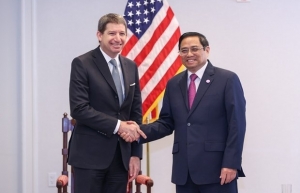 | PM proposes more US financial support for clean energy, climate change response Prime Minister Pham Minh Chinh had a meeting with Chief Executive Officer of the US International Development Finance Corporation (DFC) Scott A. Nathan on May 12 (US time) as part of his trip to the US. |
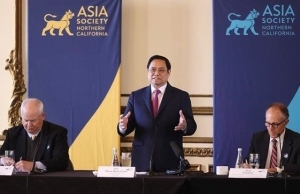 | Vietnam to work with US to develop start-ups on climate change, digital transformation: PM Vietnam expects for start-up collaboration with the US on issues of global concerns such as climate change, digital technology and supply chain diversification, Prime Minister Pham Minh Chinh has said. |
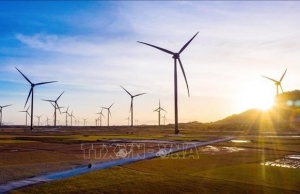 | Tasks, solutions set to fulfill COP26 commitments Deputy Prime Minister Le Van Thanh on July 25 signed a decision approving the project on tasks and solutions to implement outcomes of the 26th United Nations Climate Change Conference of the Parties (COP26). |
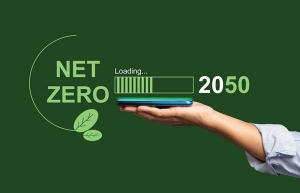 | Nation’s net-zero aim given strategic boost Vietnam’s fresh national climate change strategy, which highlights a crucial energy transition, will help the country reduce greenhouse gas emissions and fulfil its international commitment. |
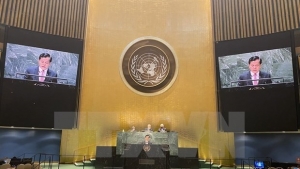 | UN leader lauds Vietnam’s commitments to climate change response Deputy Foreign Minister Ha Kim Ngoc had a meeting on August 3 with United Nations (UN) Secretary-General Antonio Guterres who highly valued Vietnam's active and responsible contributions to the common work of the organisation, especially the country’s strong commitments in the fight against climate change, and promised to continue supporting Vietnam in this work. |
What the stars mean:
★ Poor ★ ★ Promising ★★★ Good ★★★★ Very good ★★★★★ Exceptional
Related Contents
Latest News
More News
- $100 million initiative launched to protect forests and boost rural incomes (January 30, 2026 | 15:18)
- Trung Nam-Sideros River consortium wins bid for LNG venture (January 30, 2026 | 11:16)
- Vietnam moves towards market-based fuel management with E10 rollout (January 30, 2026 | 11:10)
- Envision Energy, REE Group partner on 128MW wind projects (January 30, 2026 | 10:58)
- Vingroup consults on carbon credits for electric vehicle charging network (January 28, 2026 | 11:04)
- Bac Ai Pumped Storage Hydropower Plant to enter peak construction phase (January 27, 2026 | 08:00)
- ASEAN could scale up sustainable aviation fuel by 2050 (January 24, 2026 | 10:19)
- 64,000 hectares of sea allocated for offshore wind surveys (January 22, 2026 | 20:23)
- EVN secures financing for Quang Trach II LNG power plant (January 17, 2026 | 15:55)
- PC1 teams up with DENZAI on regional wind projects (January 16, 2026 | 21:18)

 Tag:
Tag:




















 Mobile Version
Mobile Version